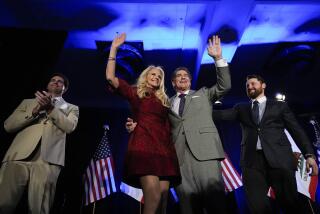Decision ’92 : VOTING IN THE VALLEY / AN ELECTION GUIDE : Sifting the Economic Rubble : Voters and candidates are focused on the recession.
For Rep. Howard Berman, the lingering recession is a growing political headache.
The veteran liberal Democrat’s district, which covers the northeast San Fernando Valley, contains two highly visible symbols of the faltering economy: the Lockheed aircraft plant in Burbank and the General Motors car factory in Van Nuys.
GM recently closed the vast plant, laying off 2,600 auto workers. Lockheed is sharply reducing its operations in Burbank, transferring hundreds of jobs out of the area and hurting local subcontractors and other businesses that depended on the giant defense firm.
Berman’s Republican opponent, although little known and given little chance of beating Berman, criticizes him for not doing more to keep the GM plant open, calling its shutdown the “biggest disaster to hit here since the Valley was settled.”
Berman has sought to insulate himself against political fallout by touting his leadership role in CALSTART, an innovative public-private partnership that promotes development of electric vehicles.
The consortium has raised $20 million--including federal grants championed by Berman--toward its goal of creating the futuristic industry and re-employing highly skilled workers now losing jobs at aerospace and car plants.
Berman’s district is not the only one in which the economy is an issue.
As the recession continues to stall manufacturing, construction and real estate sales in the Valley, how to reinvigorate the economy has become Topic A among local voters, sending candidates scrambling to lay out their recommended solutions as Election Day nears.
According to a recent Los Angeles Times Poll, 47% of Valley voters believe unemployment is the biggest economic problem facing the country. Another 19% cited the deficit, and 13% said it was the departure of American jobs to other countries.
The poll, which surveyed 378 registered voters in the Valley between Oct. 9 and 13, found that nearly two-thirds of Valley residents believe candidates for Congress and the Legislature should pay particular attention to addressing either the economy, joblessness or the deficit in their campaigns.
Forty-four percent of Valley voters said the Democratic Party will do a better job than the Republicans in making America prosperous in the years to come.
Twenty-nine percent thought Republicans should be at the economic helm.
In a somewhat contradictory finding, the poll showed local voters almost evenly split on whether the government should help business create jobs and compete better.
Forty-eight percent said government should not get involved, while 47% said it should.
The poll, which has an error margin of plus or minus 6 percentage points, also found that 41% of voters want any savings from reductions in defense spending applied to domestic programs. Thirty percent thought the money should be used to reduce the deficit; 9% said taxes should be cut with the savings.
Among the dozens of candidates running for office in the Valley, there is no lack of ideas about how to jump-start the economy. They range from the conventional (cutting capital-gains taxes) to the novel (taxing disposable diapers to encourage more jobs making cloth ones).
Some contenders have detailed economic platforms, others are short on specifics.
State Sen. Don Rogers (R-Bakersfield), who is seeking reelection in the 17th Senate District, which covers parts of the Antelope Valley, favors doing away with what he views as unnecessary government regulations on business.
Asked to specify such a regulation, Rogers said: “I don’t want to get into that game . . . Overall, there are many, many areas where we need to lighten up and back away.”
Democrats and Republicans agree that government at both the state and federal levels is largely responsible for the country’s economic woes. But some incumbents are quick to distance themselves from the problem.
“The federal government deserves a lot of blame for mishandling the economy . . . but I don’t believe I’m at fault, if I may say so,” said Rep. Anthony Beilenson (D-Los Angeles), a 16-year incumbent running in the 24th Congressional District, which stretches from Sherman Oaks to Malibu to Thousand Oaks.
He said he opposed two economic initiatives in the 1980s he believes badly damaged the economy: former President Ronald Reagan’s 1981 tax-cut bill and the large defense buildups under Reagan and President Bush.
Beilenson said he regards the tax cut as one of the major causes of the current deficit, arguing that without it, the government would have an additional $340 billion this year--enough to offset the deficit.
In many cases, a candidate’s recommended anti-recession medicine is based largely on party prescriptions.
The Democrats, traditionally the party of activist government, want to put more people to work through government job programs. Republicans, considered the party of less government, favor tax cuts to encourage consumer spending and stimulate investment.
“Really, I think government can only do so much,” said Republican Howard (Buck) McKeon, a candidate in the 25th Congressional District, which encompasses the Antelope, Santa Clarita and northern San Fernando valleys. “In the past, what they’ve done is prime the pump. We don’t have the money to prime the pump now.”
Among congressional candidates, Republicans tend to favor a constitutional amendment to balance the federal budget within four or five years. But Democrats call that idea a political sham designed to let incumbents vote for spending increases a few years more without seriously confronting the problem.
Berman called a balanced budget amendment “a cheap substitute for making decisions” about what federal programs must be cut in order to realize enough savings to close the budget gap.
He said the deficit and national debt are “serious long-term problems,” but that government must grapple first with the recession.
Besides his advocacy of CALSTART, Berman favors spending at least $10 billion per year on a federal jobs program styled after the Depression-era Works Progress Administration.
He believes large portions of that money should go for job training and investment in advanced transportation projects.
His GOP opponent, Gary Forsch, a Sun Valley hardware store manager, has attacked Berman for not working to persuade the government to ease environmental regulations and offer more tax breaks to keep it open. But Berman said GM’s decision to close is irrevocable.
“Forget GM,” he snapped, when asked about it. The government, he said, should instead concern itself with helping create “alternative manufacturing industries using the latest technology.”
Some candidates favor drastic action to cut the federal deficit--as long as it doesn’t hurt their constituents.
Rick Pamplin, a Ross Perot supporter running as an independent in the 25th Congressional District, said he, like Perot, favors a 50-cent-per-gallon gas-tax increase.
But Pamplin wants to exempt “anyone who has to use gas for work.”
Not coincidentally, many 25th District residents commute long distances to their jobs.
The contenders disagree widely on how many tax dollars should go for defense in the post-Cold War era.
Many liberals think deep cuts should be made and the money transferred to job training and other domestic programs; conservatives favor smaller cuts, saying the twin threats of war and terrorism still remain.
John Paul Lindblad, a member of the Peace and Freedom Party running in the 24th Congressional District, urged defense cuts totaling 75% over a three- to five-year period.
McKeon, the Republican 25th District contender, said he backs President Bush’s proposal to cut 5% of the defense budget each year for five years.
“We have a top-notch military that is able to go to hot spots around the world,” he said. “As long as we’re going to be the policeman of the world, we have to be prepared.”
McKeon’s Democratic opponent, James Gilmartin, wants to recall the entire U.S. currency supply, saying the government could generate billions by taxing the cash turned in by “money launderers and dope dealers.”
Among state candidates, the common economic refrain is that California’s economy can be improved by making state government more “business-friendly.”
They cite the need to loosen environmental and other regulations and reform the state’s workers compensation system.
Bill Olenick, a Democrat running against Rogers in the 17th Senate District, used the example of state rules protecting the Mojave ground squirrel.
Olenick, a probation officer from Quartz Hill, said the law requires developers building in areas considered ground squirrel habitat to set aside five acres of land for additional habitat for every one acre they build on.
The rule, he said, is unreasonable since most construction takes place in built-up areas where ground squirrels have been driven out by domestic animals.
Some of the most unconventional economic ideas come from minor party candidates, such as Bernard Zimring, a Libertarian campaigning in the 26th Congressional District, where Berman is the incumbent.
Zimring, a Van Nuys pool contractor, believes personal and corporate income taxes should be replaced by a national sales tax as a way of encouraging savings and investment. He also favors abolishing the IRS.
“We’ve got this Gestapo--and that’s the best word I can use to describe the IRS--and it’s running amok,” he said.
Pamplin, the Perot-inspired independent, said he wants to create a “solar enterprise zone” in the Antelope Valley, giving tax breaks to small, solar-oriented businesses that set up shop there.
The candidates say they get their economic ideas from a variety of sources, including courses they took in college and advice from business executives they know.
Some rely on their own business experience; others are followers of prominent economists, including free-market theorist Milton Friedman (a favorite among Libertarians and conservative Republicans) and liberal MIT economist Lester Thurow (Berman’s inspiration).
In purely personal terms, the recession has had varying impacts on the contenders.
Assemblyman Tom McClintock of Thousand Oaks, an anti-tax Republican running against Beilenson in the 24th Congressional District, said he has a number of friends and acquaintances who have been laid off recently.
“I think everybody does. Don’t you?” he said, adding that his mother-in-law decided to move from Moorpark to Arizona recently because she could no longer afford California’s taxes and high cost of living.
On the other hand, McKeon, a wealthy banker and clothing retailer, said he knows few people who have lost jobs due to the economy and doubts the recession is as severe as many people believe.
“I don’t know if this is as much real as hype . . . People are hurting, (but) I don’t see anyone going hungry,” he said.
Despite opinion surveys showing that the poor economy is foremost on voters’ minds, many candidates said constituents don’t seem unusually eager to find out about their economic positions.
McKeon said his political speeches and direct-mail advertising are “pretty much geared toward the economy” but that voters often seem unable to grasp his ideas.
“It’s hard really to reach people,” he said. “You send out a mailing . . . and you have to say a few simple things because otherwise people throw them away.”
This special section was edited by Robert Rector. The news editor was Larry Jones. Matt Moody was art director. Questionnaires were compiled by Mayerene Barker.
More to Read
Get the L.A. Times Politics newsletter
Deeply reported insights into legislation, politics and policy from Sacramento, Washington and beyond. In your inbox three times per week.
You may occasionally receive promotional content from the Los Angeles Times.






